Connect With Us
Blog
Items filtered by date: May 2024
Differences Between Foot Corns and Calluses
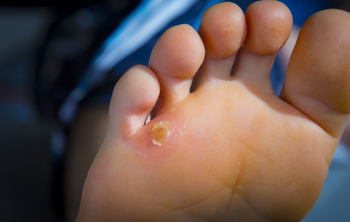
Calluses and corns on the feet are skin conditions that develop as a protective response to prolonged friction and pressure. Although they might appear similar, there are key differences between them. Calluses are broad, evenly thickened areas of skin that typically form on the soles of the feet. They can arise from activities that place repeated stress on this area, such as walking or running in poorly fitting shoes. Calluses have a hard, yellowish appearance and can cause discomfort or pain, making it difficult to walk. In contrast, corns are smaller, more concentrated areas of thickened skin, usually found on the tops and sides of toes. They develop due to the pressure and friction from wearing tight or ill-fitting shoes. Corns feature a dense, central core and can be either hard or soft. Hard corns appear on the bony parts of the toes, while soft corns develop between the toes where moisture keeps them pliable. Both corns and calluses can cause significant pain and discomfort and can lead to infection if not properly managed. Persistent or painful corns and calluses may warrant medical attention. If corns or calluses on your feet are causing you discomfort, it is suggested that you schedule an appointment with a podiatrist for targeted treatment.
Corns can make walking very painful and should be treated immediately. If you have questions regarding your feet and ankles, contact Dr. Eddy Caldwell of Foot Care of Northeast Arkansas, P.A.. Our doctor will treat your foot and ankle needs.
Corns: What Are They? And How Do You Get Rid of Them?
Corns are thickened areas on the skin that can become painful. They are caused by excessive pressure and friction on the skin. Corns press into the deeper layers of the skin and are usually round in shape.
Ways to Prevent Corns
There are many ways to get rid of painful corns such as:
- Wearing properly fitting shoes that have been measured by a professional
- Wearing shoes that are not sharply pointed or have high heels
- Wearing only shoes that offer support
Treating Corns
Although most corns slowly disappear when the friction or pressure stops, this isn’t always the case. Consult with your podiatrist to determine the best treatment option for your case of corns.
If you have any questions please feel free to contact our office located in Jonesboro, AR . We offer the newest diagnostic and treatment technologies for all your foot and ankle needs.
Safe Footwear Among Restaurant Workers

In the bustling atmosphere of a restaurant, safe footwear emerges as a top priority for workers, with slip and fall accidents posing significant risks that can lead to injuries. Diverse roles within the restaurant necessitate distinct footwear choices to optimize comfort and safety. For instance, chefs benefit from shoes with elevated insoles for prolonged kitchen hours. However, managers may prefer non-slip formal shoes, and waitstaff requires flat, non-slip options with adequate foot protection. Essential safety features like protective toe caps can defend against kitchen hazards, while lightweight materials offer protection and comfort. Waterproof, slip-resistant shoes are indispensable in moisture-prone areas, enhancing stability and confidence. Material selection, including rubber and canvas, underscores durability and ease of maintenance. Safety elements like aluminum or plastic toe caps ensure protection, particularly in canvas footwear. If you have sustained a foot or ankle injury while working in a restaurant, it is suggested that you make an appointment with a podiatrist for an exam and treatment options.
While working on the feet, it is important to take the proper care of them. For more information about working on your feet, contact Dr. Eddy Caldwell from Foot Care of Northeast Arkansas, P.A.. Our doctor will treat your foot and ankle needs.
Working on Your Feet
Standing on your feet for long periods of time can cause stress and pain in your feet. Your whole body may experience change in terms of posture, back pain, bunions, callouses and or plantar warts. There are ways to avoid these conditions with proper foot care, smart choices and correct posture.
Positive Changes
Negative heeled shoe – Choosing this shoe type places the heel slightly lower than the ball of the foot. These are great for overall foot health. Find shoes that fit you correctly.
Go barefoot – Our feet were not designed to be enclosed for all hours of the day. Try to periodically expose your feet to air.
Eliminate Pain
Foot Exercises – Performing simple exercises, incorporating yoga and doing stretches are beneficial. This will allow increased blood flow to the area and muscles of the foot.
Achilles tendon – Stretching the foot out flat on the floor will relax the calf muscles and tendon. These exercises can be performed almost anywhere. Make sure you add these exercises to your daily regimen.
With a little bit of this information and knowing more about foot health, you will notice changes. Foot stretches and proper footwear will help with pain and prevent further issues.
If you have any questions please feel free to contact our office located in Jonesboro, AR . We offer the newest diagnostic and treatment technologies for all your foot and ankle needs.
Custom Orthotics For Outdoor Activity
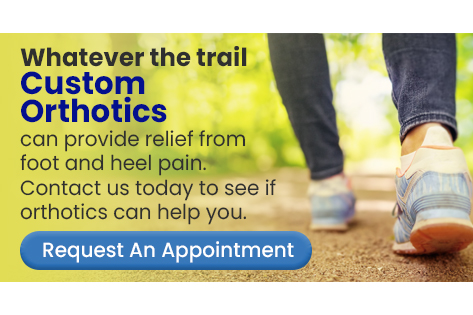
Embrace the great outdoors with confidence and comfort! Whether you're hiking, jogging, or exploring nature, Custom Orthotics are your perfect companion. Tailored to your foot's unique needs, they provide stability on uneven terrains and cushioning for those longer adventures. Don't let foot discomfort limit your outdoor experiences. With Custom Orthotics, every step is supported and secure. Call today to schedule an appointment.
The Impact of High Heels on Foot Biomechanics
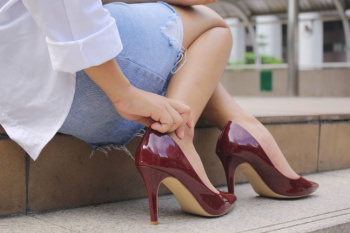
Wearing high heels can significantly alter the biomechanics of the feet, leading to various effects that extend beyond fashion considerations. The elevation of the heel shifts the body's weight forward, causing increased pressure on the balls of the feet and toes. This can result in discomfort, pain, and even the development of conditions like bunions, hammertoes, and neuromas over time. The arch of the foot is also affected, as high heels can cause it to become overly extended or flattened, potentially contributing to issues such as plantar fasciitis or Achilles tendonitis. Additionally, high heels can affect balance and stability, increasing the risk of ankle sprains or falls. Prolonged wear of high heels may lead to muscular imbalances and changes in gait patterns, further exacerbating foot problems. If you have foot pain and feel it may be coming from frequently wearing high heels, it is suggested that you schedule an appointment with a podiatrist who can offer you relief tips.
High heels have a history of causing foot and ankle problems. If you have any concerns about your feet or ankles, contact Dr. Eddy Caldwell from Foot Care of Northeast Arkansas, P.A.. Our doctor can provide the care you need to keep you pain-free and on your feet.
Effects of High Heels on the Feet
High heels are popular shoes among women because of their many styles and societal appeal. Despite this, high heels can still cause many health problems if worn too frequently.
Which Parts of My Body Will Be Affected by High Heels?
- Ankle Joints
- Achilles Tendon – May shorten and stiffen with prolonged wear
- Balls of the Feet
- Knees – Heels cause the knees to bend constantly, creating stress on them
- Back – They decrease the spine’s ability to absorb shock, which may lead to back pain. The vertebrae of the lower back may compress.
What Kinds of Foot Problems Can Develop from Wearing High Heels?
- Corns
- Calluses
- Hammertoe
- Bunions
- Morton’s Neuroma
- Plantar Fasciitis
How Can I Still Wear High Heels and Maintain Foot Health?
If you want to wear high heeled shoes, make sure that you are not wearing them every day, as this will help prevent long term physical problems. Try wearing thicker heels as opposed to stilettos to distribute weight more evenly across the feet. Always make sure you are wearing the proper shoes for the right occasion, such as sneakers for exercising. If you walk to work, try carrying your heels with you and changing into them once you arrive at work. Adding inserts to your heels can help cushion your feet and absorb shock. Full foot inserts or metatarsal pads are available.
If you have any questions please feel free to contact our office located in Jonesboro, AR . We offer the newest diagnostic and treatment technologies for all your foot and ankle needs.
Why Live with Pain and Numbness in Your Feet?
Need for Custom Orthotics
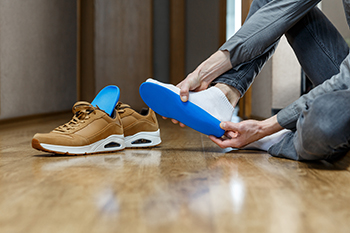
If you are experiencing persistent foot pain, discomfort, or difficulty while walking, it may be a sign that you could benefit from orthotics. Common indicators include arch pain, heel pain, flat feet, or ongoing issues like plantar fasciitis or bunions. Additionally, if you have a history of foot injuries, biomechanical imbalances, or medical conditions that affect the feet, orthotics may be necessary to alleviate symptoms and improve foot function. Determining the type of orthotics needed depends on your foot condition, gait mechanics, and lifestyle. The types of orthotics available, include rigid, semi-rigid, and soft orthotics, each designed to address different needs and provide varying levels of support and cushioning. If you have foot pain that is not improving, it is suggested that you schedule an appointment with a podiatrist to determine which orthotics are best suited to your needs.
Discover relief from persistent foot pain with custom orthotics and shoe inserts. If you’re battling heel pain, these personalized solutions offer targeted support, addressing the root causes of discomfort. Customized to your unique biomechanics, these inserts provide stability, alleviating both heel and foot pain. Say goodbye to the agony of every step and hello to a life free from constant foot pain. Invest in your well-being with custom orthotics or shoe inserts ensuring your feet receive the care they deserve. Step confidently, step comfortably – because a pain-free journey begins with the right support.
If you have any questions please contact our office located in Jonesboro, AR . We offer the newest diagnostic and treatment technologies for all your foot and ankle needs.
Foot Pain During Pregnancy
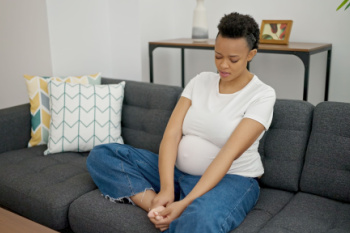 Pregnancy often brings about foot pain and lower limb changes due to increased weight and altered body mechanics as the baby grows. These changes can lead to swelling, varicose veins, and changes in foot structure. A common issue is flattened arches, which may cause pain and discomfort. Supportive and comfortable footwear, avoiding standing for prolonged periods, and elevating feet to reduce swelling are suggested to alleviate symptoms. Compression stockings can also help manage swelling and prevent varicose veins. Gentle exercise, like walking or swimming, can improve circulation and reduce leg cramps. Consulting with a podiatrist, or foot doctor, is important to get targeted treatment advice. Podiatrists can also prescribe orthotics or specific exercises to strengthen the feet and legs during pregnancy. If you are pregnant and struggling with foot pain, it is suggested that you consult a podiatrist for treatment options.
Pregnancy often brings about foot pain and lower limb changes due to increased weight and altered body mechanics as the baby grows. These changes can lead to swelling, varicose veins, and changes in foot structure. A common issue is flattened arches, which may cause pain and discomfort. Supportive and comfortable footwear, avoiding standing for prolonged periods, and elevating feet to reduce swelling are suggested to alleviate symptoms. Compression stockings can also help manage swelling and prevent varicose veins. Gentle exercise, like walking or swimming, can improve circulation and reduce leg cramps. Consulting with a podiatrist, or foot doctor, is important to get targeted treatment advice. Podiatrists can also prescribe orthotics or specific exercises to strengthen the feet and legs during pregnancy. If you are pregnant and struggling with foot pain, it is suggested that you consult a podiatrist for treatment options.
Pregnant women with swollen feet can be treated with a variety of different methods that are readily available. For more information about other cures for swollen feet during pregnancy, consult with Dr. Eddy Caldwell from Foot Care of Northeast Arkansas, P.A.. Our doctor will attend to all of your foot and ankle needs.
What Foot Problems Can Arise During Pregnancy?
One problem that can occur is overpronation, which occurs when the arch of the foot flattens and tends to roll inward. This can cause pain and discomfort in your heels while you’re walking or even just standing up, trying to support your baby.
Another problem is edema, or swelling in the extremities. This often affects the feet during pregnancy but tends to occur in the later stages.
How Can I Keep My Feet Healthy During Pregnancy?
- Wearing orthotics can provide extra support for the feet and help distribute weight evenly
- Minimize the amount of time spent walking barefoot
- Wear shoes with good arch support
- Wear shoes that allow for good circulation to the feet
- Elevate feet if you experience swelling
- Massage your feet
- Get regular, light exercise, such as walking, to promote blood circulation to the feet
If you have any questions please feel free to contact our office located in Jonesboro, AR . We offer the newest diagnostic and treatment technologies for all your foot and ankle needs.






